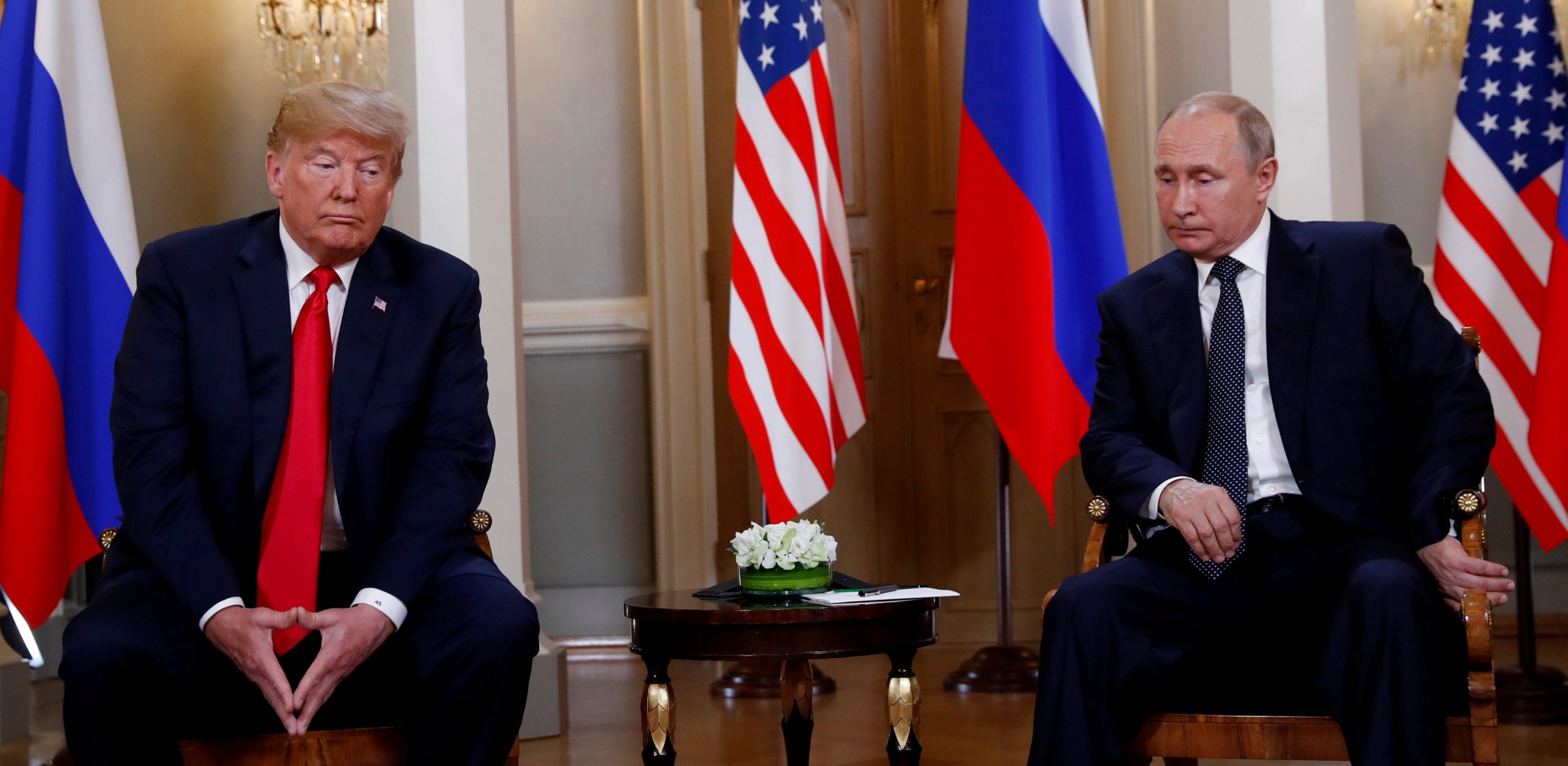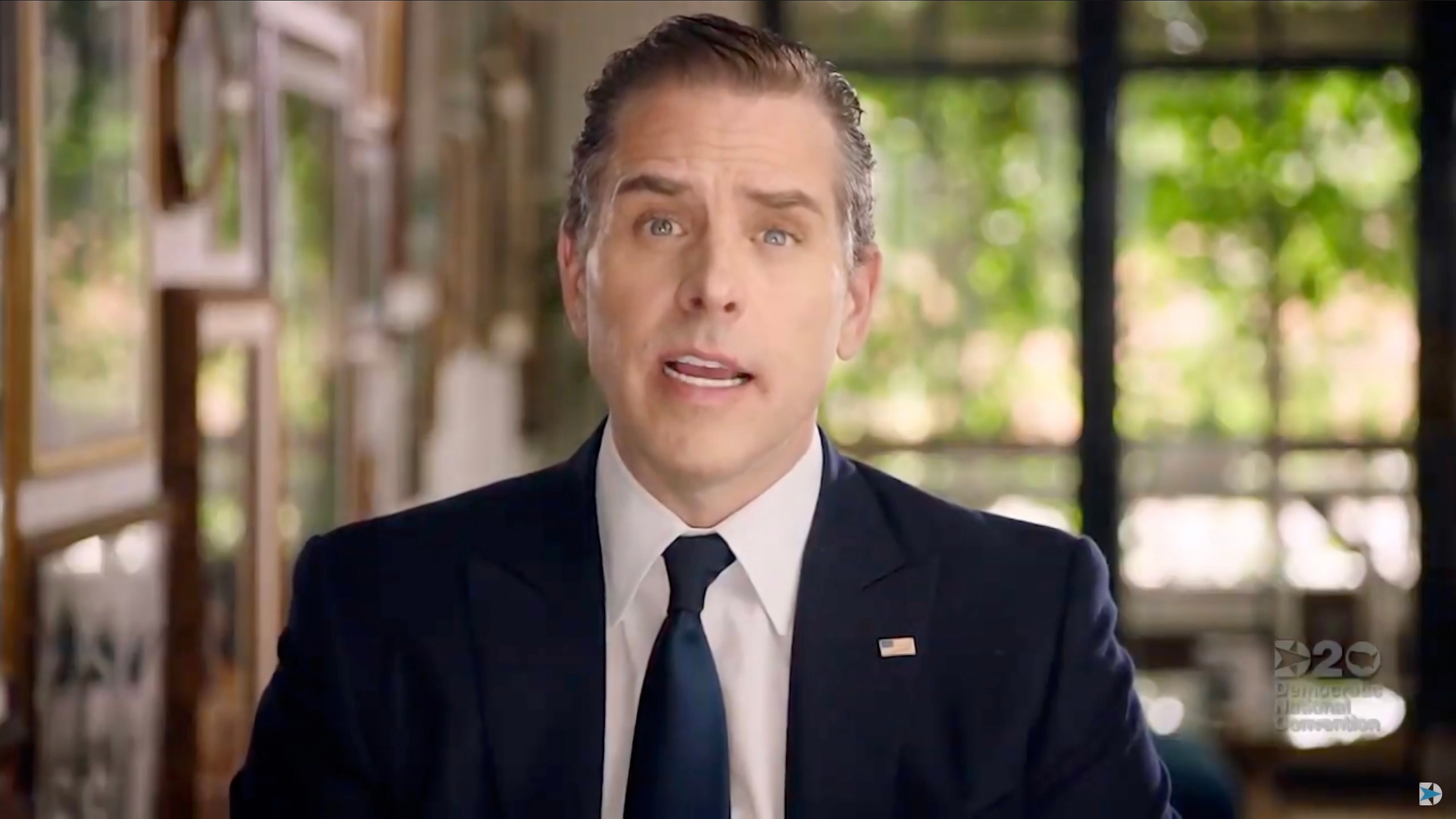From the Moscow mayor’s wife to Nato funding: Five of Trump’s wildest false claims on the Ukraine crisis
The 45th president’s false claims began before he ever took office and continued after he left, writes John Bowden

Your support helps us to tell the story
From reproductive rights to climate change to Big Tech, The Independent is on the ground when the story is developing. Whether it's investigating the financials of Elon Musk's pro-Trump PAC or producing our latest documentary, 'The A Word', which shines a light on the American women fighting for reproductive rights, we know how important it is to parse out the facts from the messaging.
At such a critical moment in US history, we need reporters on the ground. Your donation allows us to keep sending journalists to speak to both sides of the story.
The Independent is trusted by Americans across the entire political spectrum. And unlike many other quality news outlets, we choose not to lock Americans out of our reporting and analysis with paywalls. We believe quality journalism should be available to everyone, paid for by those who can afford it.
Your support makes all the difference.Donald Trump is not known for careful remarks that always reflect the truth, but there’s one subject on which he seems to veer from reality the sharpest: Russia.
The former president ended his one-term stint in the White House in January 2021 after spending four years publicly contradicting journalists, other Republicans, and even his own intelligence agencies on issues of US-Russia relations and Moscow’s campaign to influence US politics through misinformation on social media. But his warm words for Vladimir Putin and the Russian government wouldn’t end there, as the US president would frequently touch on the subject after leaving office in interviews, at campaign-style rallies, and elsewhere.
Some of Mr Trump’s statements on Russia didn’t rise to the level of outright lies or incorrect claims, of course; in many instances, the 45th president merely diverted from norms by appearing to wholeheartedly embrace a foreign leader denounced by US officials and America’s allies around the world as a murderer and brutal autocrat.
In recent weeks, much of the former president’s past statements are being revisited amid Russia’s invasion of Ukraine and the assertion of Mr Trump and his allies that he was “tough” on Russia and Mr Putin and would not have permitted such a war to break out under his watch.
With that in mind, let’s take a look at some of Donald Trump’s “greatest hits” when it comes to Russia and its work to put him in office in 2016, from before he was sworn in to the present day.
1. The first and last joint press conference
When Donald Trump met in Helsinki, Finland, with Vladimir Putin in 2018, the shockwaves resulting from their conversation reverberated for months.
Emerging from a private meeting with the Russian leader, Mr Trump stood alongside Mr Putin, a rare enough occurrence for any US president, before doing something that would go down in history: publicly contradicting the conclusions of his own intelligence community, and siding with Russia on its explanation for interference in the 2016 election.

"President Putin says it's not Russia. I don't see any reason why it would be," Mr Trump told shocked reporters, while many US officials and his own aides likely felt that same sense of surprise.
The US intelligence community had concluded in a report, published publicly more than a year earlier: “We assess Russian President Vladimir Putin ordered an influence campaign in 2016 aimed at the US presidential election. Russia's goals were to undermine public faith in the US democratic process, denigrate Secretary Clinton, and harm her electability and potential presidency. We further assess Putin and the Russian Government developed a clear preference for President-elect Trump.”
The damage that Mr Trump inflicted with his words was immediate, and White House aides attempted to walk his statement back. But it followed a long pattern of Mr Trump casting doubt on the explanation for interference in the 2016 election released by US intelligence officials.
2. Hunter Biden’s supposed $3.5m gift
While very real criminal investigations into the workings of the Trump Organization, as well as surrounding the January 6 attack on Congress continue, Donald Trump has remained focused on crimes he has baselessly alleged that the Biden family is involved with.
Among the latest of his allegations against the Biden family is the charge that Hunter Biden was the recipient of a gift of $3.5m from the wife of Moscow’s former mayor through an investment firm he supposedly co-founded.

The problem? Hunter Biden’s attorneys have strongly denied that he had any involvement in the investment firm in question, and was not a co-founder, as Republicans have alleged. Mr Biden did co-found a firm known as “Rosement Seneca”, but has strongly denied any involvement in “Rosemont Seneca Thornton”, the firm which received the $3.5m.
Mr Trump’s claim in this instance is actually based on a finding of a report from Republicans on the Senate Homeland Security Committee, which too stated that Hunter Biden “received a wire transfer” for $3.5m from Elena Baturina, widow to Moscow’s former mayor Yury Luzhkov. Mr Biden’s lawyers have said that report’s finding is in error, as it is based off the same assumption that Mr Biden is involved with Rosemont Seneca Thornton.
3. I have ‘nothing to do with Russia’
Throughout the 2016 campaign and into the early months of his presidency (when the Russia intelligence community assessment was released), then-candidate Trump repeatedly insisted that he had no business in Russia or interests in the country beyond an old business deal.
“What do I have to do with Russia? You know the closest I came to Russia, I bought a house a number of years ago in Palm Beach, Florida," Mr Trump said at a press conference shortly before taking office in January of 2017. "There was a man who went bankrupt and I bought the house for $40m and I sold it to a Russian for $100m including brokerage commissions.”
That wasn’t true. It was later revealed that Mr Trump had pursued plans for a “Trump Tower Moscow”, and in 2019 Buzzfeed News reported that Mr Trump’s then-attorney Michael Cohen had lied to Congress about the scope of his Russian business dealings. Mr Trump was found in the Mueller Report, which investigated his connections to Russia, to have potentially known this. The report stated: “There is evidence ... that the president knew Cohen provided false testimony to Congress” regarding his business dealings.
4. Nato nonsense
One of former President Trump’s favourite claims to return to on the issue of US-Russia relations is his persistent falsehood regarding the participation of Nato-aligned countries in the alliance’s defensive pact.
Mr Trump has repeatedly insisted that he was responsible for countries like Germany vowing to contribute more to the Nato alliance, even declaring to the UN Security Council in 2019, while he was still president: “I was able to, over the last couple of years, increase their contribution”, referring to Nato countries.
“[O]ver the last couple years, I had them increase by $130bn,” he went on to falsely claim.
There is one Nato-aligned nation that significantly increased European defensive spending during the Trump administration — the United States, which as Nato Secretary-General Jens Stoltentberg noted in 2018 had increased by nearly half since Mr Trump took office.
“Since Trump became president, US funding for military presence in Europe — the European Deterrence Initiative — has been increased by 40 per cent,” Mr Stoltenberg said at a Nato summit that year, quipping “[a]ctions speak louder than words.” Mr Trump had vowed to decrease spending to Nato if US allies did not increase their own contributions.
As for other nations in the defensive pact, spending increases for European defense far predate Mr Trump’s presidency. A graph of Nato member-state contributions compiled by the organisation itself shows that military spending began steadily increasing in 2014 following Russia’s invasion of Crimea, and that trend did not change in a meaningful way up or down during the Trump presidency.
5. ‘I sent the Javelins’
At a post-presidency rally in Florence, South Carolina earlier this month, Mr Trump made one of his most brazen attempts yet to alter his legacy on the issue of Russia.
Addressing the invasion of Ukraine, and the Ukrainian military’s fight against Russian forces, Mr Trump declared: “I sent the Javelins” that Ukrainian forces are using against Russian tanks and other vehicles. It was one of several statements the ex-president and his allies have made in recent days attempting to take credit for US aid to Ukraine, which has suddenly become an extremely popular political issue.
While not an outright lie, as noted above, the statement clearly falls into the realm of an attempt to misrepresent the truth given that the 45th president was famously impeached (for the first time) in 2020 after it was revealed that he had tried to pressure Ukraine’s now wartime leader, Volodymyr Zelensky, into opening a highly political criminal investigation into claims that Joe Biden or his son broke the law in the country with their past business dealings.
At the time, the Trump administration was actually holding up military aid to Ukraine, rather than letting it be transferred unimpeded. And while Mr Trump didn’t mention the military aid shipments on his call with Mr Zelensky, the decision to hold up the aid was made around the same time as the July 2019 conversation and the aid was not released for months.


Join our commenting forum
Join thought-provoking conversations, follow other Independent readers and see their replies
Comments